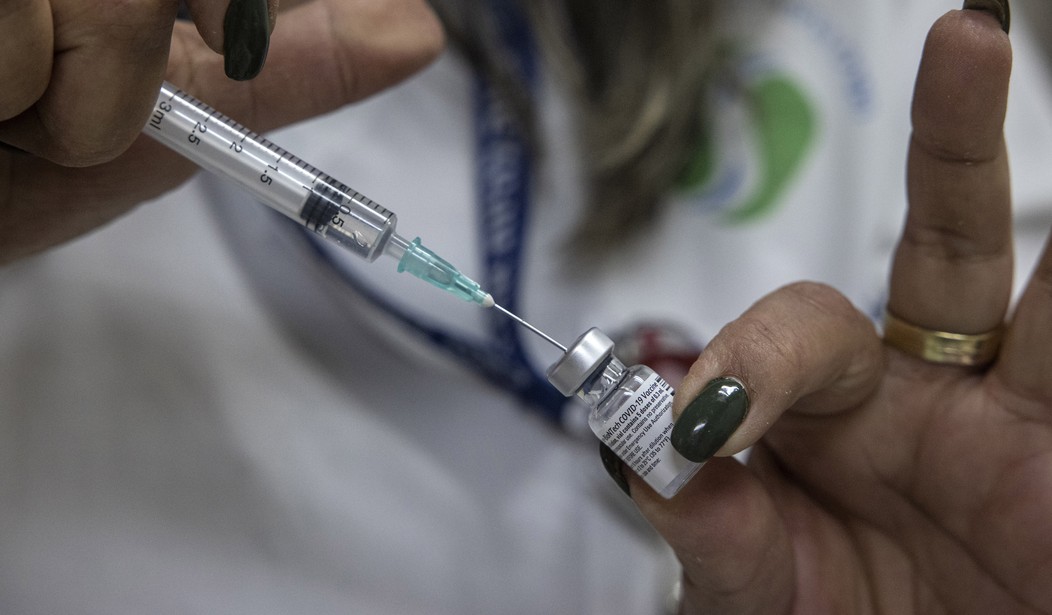Yesterday, Allahpundit covered the news that Pfizer is planning to seek emergency authorization for a third dose of the Pfizer vaccine as soon as six months after your initial vaccination to act as a booster shot, particularly intended to help combat the Delta variant of the virus. I was compelled to do a bit more digging into the subject, primarily because my immediate reaction was to think that this sounds like it’s way too soon. There still isn’t a lot of information available on this latest wrinkle to the story, but a couple of items popped up that I wanted to address today.
First of all, as to the need for a booster, Pfizer does seem to be making one argument based on their third-phase trials that might convince a few people. We’re still quite some time away from having approval for a “tweaked” version of the vaccine specifically tuned to go after the Delta variant, so for the time being we’ll just deal with the currently approved version. The number that should jump out at us first is the dismal level of protection offered against Delta by antibodies produced naturally after having survived the original version of the virus. They’re practically useless. And if you only received one dose of Pfizer and didn’t bother to get the second one, you only have a ten percent chance of fighting off Delta. But if you had two shots, the efficacy rate shoots up to 95%. And the latest research out of France seems to confirm this. (Associated Press)
New research from France adds to evidence that widely used COVID-19 vaccines still offer strong protection against a coronavirus mutant that is spreading rapidly around the world and now is the most prevalent variant in the U.S…
Researchers from France’s Pasteur Institute reported new evidence Thursday that full vaccination is critical.
In laboratory tests, blood from several dozen people given their first dose of the Pfizer or AstraZeneca vaccines “barely inhibited” the delta variant, the team reported in the journal Nature. But weeks after getting their second dose, nearly all had what researchers deemed an immune boost strong enough to neutralize the delta variant — even if it was a little less potent than against earlier versions of the virus.
With that in mind, how much higher can your protection rate go with a booster? Against the original virus, two shots of Pfizer gets you to 95% efficacy. Maybe 97? We’ve already been assured by the CDC that no vaccine gets people to a 100%, solid-gold protection rate. Is it really worth the side effects (and as-yet-unknown potential long-term consequences) just for an extra two percent? I’m thinking it’s not. But we also don’t yet know how much the two-dose efficacy drops over time. If we’re talking about Delta, Pfizer is only 64% effective in terms of total prevention. But two doses still offers a more than 90% efficacy rate in terms of surviving and keeping you out of the hospital. That seems like a reasonable tradeoff if the alternative is a respirator or a coffin. But if it sags down into the range of 60% or below after six months, perhaps we can revisit that.
The other argument being made is that it would be foolish to start pushing booster shots when, as AP put it, “there are still millions out there who need their two doses.” If we were having this conversation back in February or March I would absolutely agree. But the entire formula has changed in the past few months. Looking at this in a strictly supply versus demand approach, the simple fact is that we do not have a shortage of vaccine doses in the United States. If your argument is that we should be shipping them all to other countries, fine. There are billions of people out there who are still waiting. But that’s not the case in America.
As of last month, there were already more than 5 million doses sitting unused in Florida and approaching their expiration dates. New York had to issue new guidelines in June for rerouting unused doses so they didn’t all wind up being flushed. More than twenty states have canceled their previous orders for more doses or significantly slashed the quantities they were requesting.
We don’t have the rate of unvaccinated citizens that we’re seeing because they can’t find any place that has enough vaccine to jab them. We have these rates because a certain percentage of the population is either not sure they want to get the shot or are simply opposed to doing so. And for those people who were refusing to get two shots, do you really think any of them are now going to turn around and say, ‘oh, but if you’re saying I need three shots now, sign me up!”
So if we have to go with a booster, fine. Let’s start handing out the boosters at the appropriate time. But we deserve to see the full results of Pfizer’s testing first to make sure that this is really a requirement and not just a case of jabbing hundreds of millions of people again “out of an abundance of caution.” We’re going to need years worth of data, not months, before people grow more confident that this new mRNA technology doesn’t have some long-term negative effects that nobody saw coming.








Join the conversation as a VIP Member